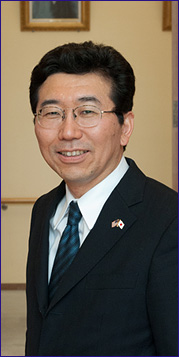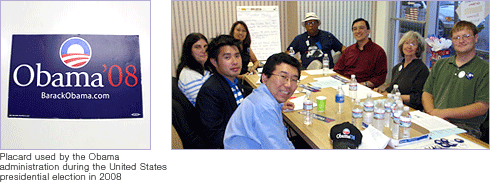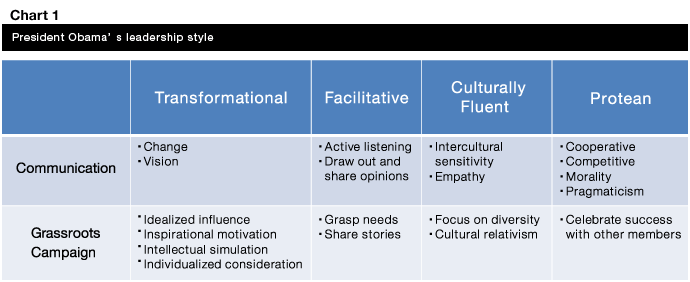

As a result, the survey revealed that President Obama’s leadership style consists of four elements: transformational, facilitative, culturally fluent and protean leadership. I would like to refer to his leadership style (Chart1).

Transformational Leadership
According to Bernard M. Bass, who is renowned for his research into leadership, transformational leaders are charismatic and will denote vision, motivate people, provide intellectual inspiration and pay special attention to subordinates’ needs for achievement. “One people” that extends beyond race and ethnic group and “the world without nuclear weapons” are aspects of President Obama’s vision.Members of Barack Obama’s grassroots campaign defined President Obama as a “charismatic leader” during the presidential election in 2008. Although his catch phrase “Yes, we can” became famous in Japan, “fired up” and “ready to go” were the slogans frequently used by Barack Obama’s grassroots campaign and staff members. Obama used these slogans and enhanced the motivation of supporters.
President Obama questioned conventional ways of thinking and methods of resolving issues and provided intellectual inspiration to voters by posing a new approach. For example, he shifted voters’ attention from the Iraq War to the Afghan War, thereby making a point that “the security of Afghanistan, Pakistan and the United States are interlinked.” In terms of the Afghan War, President Obama appealed that relying solely on military capability is not enough and a comprehensive approach is required for resolving issues, including agriculture, education and infrastructure. Obama’s transformational leadership is also evident from his statement that the “voice of one voter will give rise to innovation.” As a result, the individuality and capability of each grassroots member were developed by Obama campaign.
Facilitative Leadership
The term facilitation means to make a process easier. Obama previously taught constitutional law at the University of Chicago. According to his student Ramy Ko,Obama drew out students’ opinions and listened actively. Obama played a role as a facilitator during his class.As a community organizer, Obama also gathered local residents, conducted facilitation and fulfilled their needs and interests. Obama applied this method in the election, as members of Barack Obama’s grassroots campaign were expected to listen actively to voters’ opinions and grasp their needs. President Obama played a role of facilitator in Congress for reinforcing the U.S. military in Afghanistan and passing the Healthcare Reform Bill that the Democratic and Republican parties attended to.
Culturally Fluent Leadership
Several cultural values that are inherent within Obama are influencing his leadership. African-American culture, white culture, Indonesian culture, and Asian American and Pacific Islands culture coexist within him. By controlling various cultural values, President Obama is characteristically capable of maintaining coexistence of multiple cultures. In other words, Obama is a multicultural person.President Obama’s stance of emphasizing diversity is also evident in terms of personnel affairs and meetings. He has intentionally employed cabinet members and White House staff who have different opinions and ideas. The U.S. Secretary of State Hillary Clinton and the U.S. National Security Advisor General James L. Jones, who has contact with John McCain, are examples of such members. President Obama dislikes easy unanimous approval at meetings and places importance on different perspectives.
Protean Leadership
Protean leadership includes cooperation, competition, morality and pragmaticism. In the U.S. Senate special election held in January 2010 in Massachusetts which is known as a liberal state, the Republican candidates defeated the Democrat candidates. Since this election, President Obama’s style of leadership has changed. In the State of the Union Address, President Obama appealed to voters, especially independent voters, saying that he will continue the challenge to create jobs. It was a speech that fully emphasized his image as a “fighter.” Additionally, President Obama also used the words “fight” and “fighting” over 15 times or more during his speech in Tampa, Florida. His style of leadership has shifted from “cooperation” to “competition.”As for the Healthcare Reform Bill, President Obama lobbied Representatives in Congress and seized the initiative. President Obama had been taking an approach considering both perspectives of morality and pragmaticism as previously, which is evident from his statements that “insurance should be provided for uninsured persons” and “medical expenses should be curbed.”
Perhaps leaders with such skills are expected in today’s society. In the future, I hope to implement human resource development training that will incorporate President Obama’s leadership style for students and corporate leaders.
Profile
Dr. Motoo Unno is a professor at Meiji University in Tokyo, Japan. He was a visiting scholar of the School of International Service (SIS) and the Intercultural Management Institute (IMI) at American University in Washington, D.C. from April 2008 to March 2010. His research focuses on cross-cultural communication and leadership styles. Dr. Unno has presented and facilitated training sessions for corporate audiences and municipal government. He is the author of over 10 books, including Obama + Connolly versus Tea Party (2011), The Toyota Congressional Hearings (2011) and Obama Grassroots (2009). His new book about the Fukushima Daiichi nuclear plant disaster will be published this fall by Doyukan Inc. in Tokyo. Dr. Unno participated in the Obama grassroots campaign in the U.S. State of Virginia, one of the election battlegrounds to become a “Blue State” on November 4th. As a volunteer, he knocked on 1,186 doors during the campaign and is the founder and president of “Sushi for Obama.” During the 2010 midterm election, he knocked on 552 doors for Congressman Gerry Connolly (D-VA). He is a member of the Society for Intercultural Education, Training and Research (SIETAR) and the Academy of Management (AOM).Main Research Paper
Unno, M. (2010). The Toyota Congressional Hearings: A cross-cultural conflict situation. Intercultural Management Quarterly, 11 (3). 8-11.Unno, M. (2009). Contrast in leadership: Monocultural Overseas Japanese Managers and the Multicultural Barack Obama. Intercultural Management Quarterly, 10 (3). 3-6.
Unno, M. (2008). Japan and the U.S. in the workplace. Intercultural Management Quarterly, 9 (3). 15-18.









